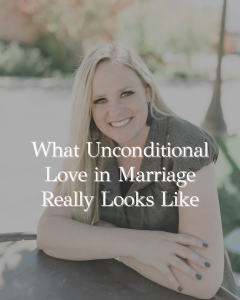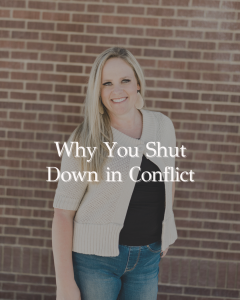
When we think about unconditional love, it always sounds romantic and exciting, right? We’ve all seen the romcoms where they have the kind of love that never falters, regardless of what happens. It’s the idea that someone is loved completely, no matter their choices, behaviors, or circumstances. But in marriage, the idea of unconditional love should be more nuanced. It may seem wonderful on the big screen, but in reality, unconditional love in marriage is a partnership between two adults with needs, boundaries, and expectations. It isn’t about tolerating harmful behavior or being a doormat. It’s about striving to accept your partner as they are, flaws and all, while also keeping a hold of your sense of self and safety. In this episode, we’re going to talk about what unconditional love should look like in marriage and how to achieve it.
Show Summary:
Unconditional love is often romanticized as the kind of love that never falters, regardless of what happens. It’s the idea that someone is loved completely, no matter their choices, behaviors, or circumstances. This concept is most easily seen in the relationship between a parent and child. Parents often love their children not because of their achievements or behavior, but simply because they exist. It’s a love that feels boundless and enduring.
In marriage, the idea of unconditional love becomes more nuanced. While it’s a beautiful ideal to love and accept your spouse fully, we must recognize that marriage is a partnership between two adults with needs, boundaries, and expectations. To love unconditionally in this context doesn’t mean tolerating harmful behaviors or being a doormat. It means striving to accept your partner for who they are, flaws and all, while also maintaining your sense of self and safety. For example, if your spouse struggles with chronic forgetfulness or a tendency to be messy, loving them unconditionally might look like accepting these imperfections while working together to find solutions that work for both of you. However, it doesn’t mean tolerating neglect, abuse, or constant disregard for your feelings and needs.
So this begs the question: “Should We Have Unconditional Love in Marriage?”
This is a question that doesn’t have a simple yes or no answer. In theory, unconditional love sounds like the foundation of a strong marriage. But in practice, it’s essential to differentiate between unconditional love and unconditional tolerance. Loving your spouse doesn’t mean accepting every behavior or remaining in the relationship no matter what. Love that is truly unconditional still allows for boundaries, accountability, and growth.
Imagine a scenario where a spouse consistently dismisses their partner’s emotional needs. Perhaps they interrupt when their partner speaks or fail to show empathy when their partner is upset. Loving unconditionally doesn’t mean saying, “It’s fine because I love them.” Instead, it might look like expressing, “I love you deeply, and I want us to have a stronger connection. But this pattern is hurting me, and we need to address it.”
On the flip side, we also don’t want love in marriage to become overly conditional. If we withdraw love every time our partner disappoints us, the relationship becomes transactional—“I’ll love you, but only if you do exactly what I want.” This can create an environment where both partners feel like they have to earn love, which erodes trust and intimacy over time.
Ultimately, the healthiest love is a balance: unconditional in its depth of acceptance but conditional in its expectations for respect, safety, and mutual growth.
When Love Should Be Conditional
There are times when conditions are not only appropriate but necessary. For example, if a spouse is abusive—whether physically, emotionally, verbally, financially, or spiritually—it’s critical to set boundaries to protect yourself. Unconditional love doesn’t mean allowing harmful behavior to continue. You can still love someone as a person, perhaps even feel compassion for the struggles that led them to act this way, but you don’t have to remain in a relationship where your safety or dignity is compromised.
Let’s consider an example of emotional abuse. Imagine a spouse who constantly belittles their partner, dismissing their opinions and making them feel small. The partner being belittled may try to set boundaries by saying, “I won’t tolerate being spoken to like this. If it happens again, I’ll leave the conversation.” If the behavior continues despite clear boundaries, the partner may decide to end the relationship, not because they stopped loving their spouse, but because the conditions for a healthy relationship are no longer being met.
Loving conditionally in these situations isn’t about punishment, although it can often feel like it to the person who is on the receiving end of a boundary; it’s about self-preservation and respect for the sanctity of the relationship. A marriage should be a place of safety, trust, and mutual respect. When those conditions are violated repeatedly, it’s okay to choose love from a distance.
When Love Shouldn’t Be Conditional
At the same time, we shouldn’t make love in marriage contingent on our partner meeting every expectation or never making mistakes. Marriage requires grace. Your spouse is a human being with flaws, just like you. Withholding love for small mistakes or imperfections can create a climate of fear and insecurity in the relationship.
For instance, if your spouse forgets your anniversary one year, it’s okay to feel hurt or disappointed, but withdrawing love as a form of punishment—giving them the silent treatment or withholding affection—can harm the relationship. Instead, you might approach the situation with understanding, saying something like, “It hurt me that you forgot our anniversary. I’d love for us to celebrate in some way, even if it’s belated.” This approach acknowledges your feelings while leaving room for repair and connection.
Similarly, imagine a spouse who struggles with emotional vulnerability. Perhaps they weren’t raised in an environment where feelings were openly discussed, and it takes them longer to open up. Loving unconditionally here might look like patiently supporting their growth instead of demanding that they change overnight. You’re not excusing the behavior, but you’re also not withdrawing love because they’re imperfect.
Loving and Accepting Your Spouse as They Are
A key component of love in marriage is acceptance. This doesn’t mean settling for less than you deserve, but it does mean embracing your spouse’s humanity. No one is perfect, and expecting your partner to meet all your needs or fit a mold of perfection can lead to chronic dissatisfaction.
Think about a spouse who’s a dreamer—always coming up with big ideas but struggling to follow through. Instead of criticizing them for their lack of follow-through, you might focus on the creativity and passion they bring to the relationship. At the same time, you can communicate how their follow-through affects you and work together on practical solutions, like setting small, actionable goals.
Accepting your spouse also means letting go of the need to control or “fix” them. Too often, we approach marriage with the mindset that our partner needs to change to make us happy. But lasting love isn’t about changing the other person; it’s about growing alongside them.
Unconditional Love for Yourself
While love in marriage may not always be unconditional, the love you give yourself can be. In fact, unconditional self-love is essential for a healthy partnership. When you tend to your own needs and nurture your inner child, you’re better equipped to show up in your marriage without relying on your spouse to fill every void.
For example, if you find yourself craving validation from your partner, pause and ask, “What part of me feels unloved or unseen right now?” By offering yourself the love and reassurance you seek, you can approach your spouse from a place of wholeness rather than neediness.
Unconditional self-love also helps you establish healthier boundaries. When you value yourself, you’re less likely to tolerate mistreatment, and you’re more likely to approach conflict with confidence and clarity.
As we embrace the spirit of love this February, let’s remember that love in marriage isn’t about perfection. It’s about choosing each other every day, even when it’s hard, and balancing grace with accountability. It’s about creating a partnership where both individuals feel seen, respected, and safe.
Unconditional love has its place—but only when paired with boundaries and mutual respect. By loving your spouse with acceptance and compassion, while also loving yourself unconditionally, you can build a marriage that thrives on trust, connection, and growth which is necessary and foundation for a great sexual relationship as well.
Remember, love is a journey, not a destination. Stay committed, stay passionate, and stay connected. Goodbye for now.



